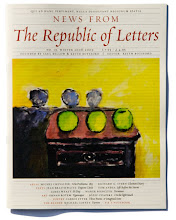http//thefastertimes.com/fiction/2010/04/27/a-new-literary-magazine-ranking
This is a quite nifty and intelligent attempt to do the impossible.
It started out as a ranking and then became a list. In the earlier version, TRoL managed to be in the fifth tier, which I guess you might call the Honorable Mentions. In the subsequent listing, we are still there.
The author's criteria for selection seem to me sound, at least in part, the question being 'If you were a writer, to whom should you try to flog your merchandise?' The objective of most writers being to get themselves published, notice and (possibly) paid, there are an awful number of variables in the mix, but this is an honest attempt to give advice.
Here are some thoughts on the subject:
1. I don't think Pushcart or O.Hara awards are a sound basis for scoring. I know I wince when I have to send copies to Pushcart, though their hearts are undoubtedly in the right place. At best, publication in Pushcarft (and yes, we have won some, I think), is a sign of competence: not of originality or significance. As for O. Hara, I pass. I know nothing about it.
2. The fundamental error is that the list of magazines is parochial. TRoL is an international magazine. We publish the best literature we can find. Oddly enough, it's been some time since America led in the field, so we have to find mss among the French, the Italians, the Poles, the Russians, the Latin Americans and so on. Most of the magazines listed are pretty monoglot.
3. There is a generational gap among magazines, which is related to circulation, location, gossip and trivia. TRoL is my ninth magazine, and when I look back over a sixty-year career in the field, I think I can safely say that the anthology (Saul Bellow & Keith Botsford: Editors, available from the Toby Press) of this magazine and its predecessors, is ample evidence of our quality. But we are probably not as up to date as some. We just do our work. We don't Facebook or Twitter.
4. There are also peculiarities to TRoL which go unacknowledged in such a listing. We are the ONLY magaz,ine I know of that will publish texts up to book-length; we are the ONLY magazine that consistently revisits, in the Archives section, literature that has been forgotten or unjustly neglected.
5. The purpose of the listing is weighted towards magazines to which writers should submit. We are committed to publishing a magazine in which the intelligent Reader, be he writer or not, can find a sense of discovery.
6. It needs also to be said that in the magazines listed, some are commercial, and most are subsidized. TRoL owes nothing to anyone. We don't have 'student' readers, or juries to select what gets published. We don't apply for grants. One old man does all the work and foots the bill. I guess that makes us, however estimable, relicts.
Lahti
2 years ago












